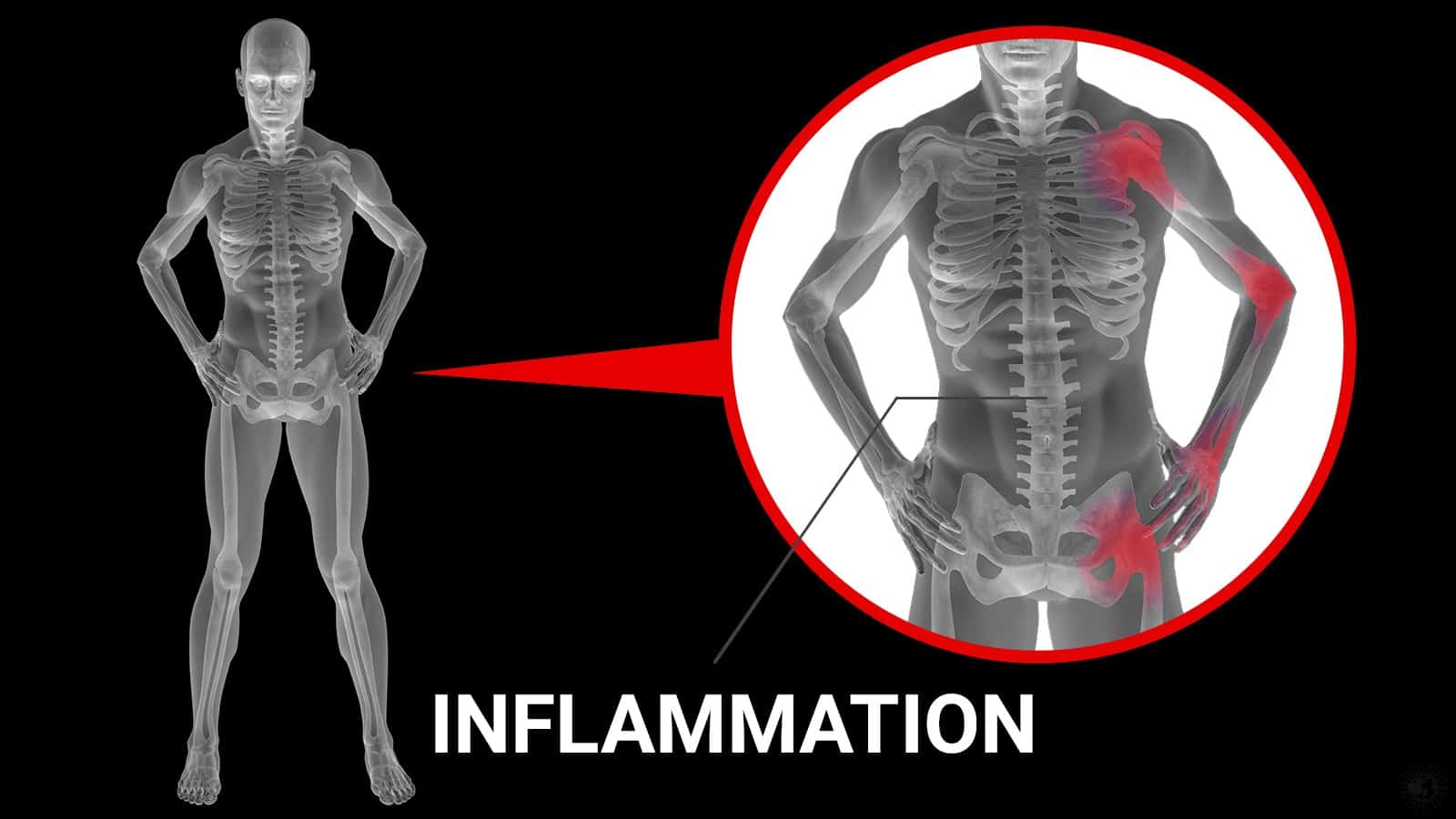Inflammation is a tricky thing. On the one hand, “inflammation serves as a good friend to our body,” says Mansour Mahamazadeh, Ph.D., director of the Center for Inflammation and Mucosal Immunology at the University of Florida. “But if immune cells start to overreact, that inflammation can be totally directed against us.”
When inflammation is “totally directed against us,” we can end up with a number of health problems: immunity problems, joint pain, heart disease, cancer, insomnia, trouble breathing, gum damage, obesity, skin disorders, bone damage, and even psychological issues.
Signs of Inflammation
Per Medical News Today, the symptoms and effects of short-term inflammation (acute inflammation) are represented by the acronym PRISH:
Pain: Inflamed areas are likely to be sensitive to the touch. Inflammation releases chemicals that stimulate nerve endings – this heightens the pain response.
Redness: Capillaries underneath the inflamed area are flush with blood which makes the area appear red.
Immobility: Inflammation can cause the loss of function if located around joints and muscles.
Swelling: The inflammatory response always induces swelling due to the release of histamine and fluid buildup.
Heat: As more blood flows to the inflamed area, it begins to feel warm to the touch.
Chronic (long-term) inflammation can create new and overlapping symptoms including:
– abdominal pain
– chest pain
– fatigue
– fever
– joint pain
– mouth sores
– skin rash
The causes, onset period, duration, and health outcomes of acute and chronic inflammation are very different. Acute inflammation is caused by harmful bacteria or tissue injury; chronic inflammation by pathogens, viruses, and overreactive immune responses. Acute inflammation has a rapid onset of symptoms; chronic inflammation is progressive and often slow. The short-term variety lasts a few days while chronic inflammation can last months or even years.
Inflammation and Diet
Per WebMD “In a nutshell, anti-inflammatory foods are those that any mainstream nutrition expert would encourage you to eat.” In other words, plenty of fruits and vegetables, whole grains, plant-based proteins, fatty fish, and fresh herbs and spices.
It goes without saying that proper diet is absolutely crucial to a healthy inflammatory response. As an added bonus, an “anti-inflammatory diet” is both well-rounded and incredibly healthy!
Here are 10 foods that fight inflammation, according to experts:
1. Blueberries
Besides being delicious, blueberries are loaded with anti-inflammatory agents. In fact, it’s one particular antioxidant – anthocyanin – that provides many of these health benefits and gives the fruit its beautiful deep-bluish hue.
Blueberries are also low in sugar, high in fiber, and contain plenty of the vitamins A, C, and E.
2. Bone Broth
Bone broth contains a number of healing agents including collagen, gelatin, and amino acids. Broth also helps give the bones strength with a healthy dose of calcium and keeps our body humming along with plenty of magnesium and phosphorous.
3. Broccoli
Broccoli may be a somewhat “boring” vegetable (thanks, childhood!), but it is nonetheless one of healthiest. Actually, broccoli is classified as a ‘superfood’ – a rare designation befitting of its nutrient- and vitamin-packed goodness.
4. Dulse
Okay, so if you’re one of the five people who recognize this food, go ahead and give yourself a pat. For the rest of us, dulse is a sea vegetable that happens to be one of the healthiest foods around. This seaweed contains plant-based protein, iron, iodine, fiber, and potassium aplenty.
5. Kale
Kale is also a member of the prestigious ‘superfood’ group – and is one heck of an inflammation fighter. Packed with antioxidants and phytonutrients, kale helps promote cellular health and is a natural detoxifier. Kale is rich in vitamins A, C, and K; calcium, fiber, iron, magnesium, and other amino acids.
6. Mushrooms
Mushrooms may be the most versatile food on this list in terms of health benefits. ‘Shrooms are an anti-microbial, anti-inflammatory, and antiviral food. They contain potent antioxidants including one, in particular, ergothioneine, that pounds inflammation into submission. Mushrooms are also an excellent source of B vitamins, fiber, and protein.
7. Pineapple
Who knew that something as delicious as pineapple could be so healthy? This fibrous fruit contains health-promoting enzymes which also ease digestion, boost immune system function, and reduce inflammation in the gut.
8. Salmon
Wild salmon is a fantastic source of omega-3 fatty acids, which are among the most potent anti-inflammatory substances. Omega-3s are also known to reduce the risk of chronic illness and improve mental health and cognitive function. Salmon is abundant in protein and tons of minerals including potassium and selenium, and vitamins B-3, B-12, and D.
9. Sauerkraut
Sauerkraut is packed with probiotics which are crucial to improving and maintaining digestive health. Healthy gut bacteria also helps keep inflammation in check. Besides probiotics, sauerkraut is crammed with vitamins C and K, fiber, and iron.
10. Spices and Herbs
More specifically, garlic, ginger, and turmeric. All three are excellent for warding off and neutralizing inflammation. Turmeric contains curcumin, which is one of the best compounds for cellular health; ginger is an excellent immune booster, and garlic is a natural antifungal agent!
https://youtu.be/yG-G9_LOkLA
















